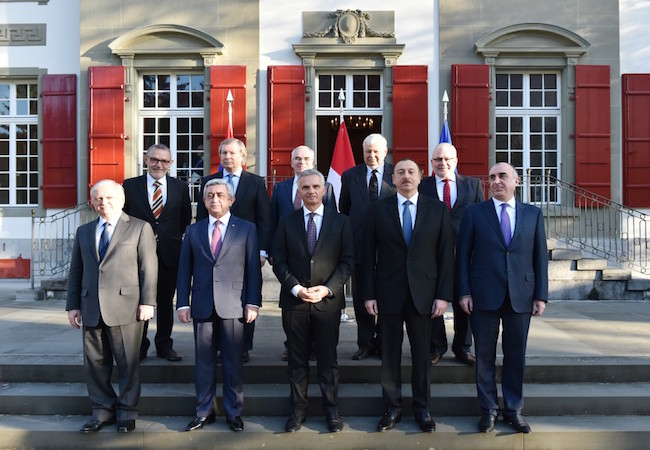Azerbaijani and Armenian leaders hold talks over Nagorno Karabakh in Switzerland

The presidents of Armenia and Azerbaijan met in Berne on Saturday to hold talks over the protracted Nagorno Karabakh conflict.
The talks come at a time of unprecedented surge in violence between the Armenian and Azeri militaries since these South Caucasian nations signed a ceasefire agreement in May 1994. According to various reports, the conflicting parties have started using mortars, heavy artillery and tanks to harm the enemy positions, a deterioration on the frontline unseen in the last two decades.
The negotiations were held at the initiative of the Swiss Foreign Minister Didier Burkhalter. While the specifics of the meeting between President Sargsyan of Armenia and President Aliyev of Azerbaijan were not made public, the Swiss Foreign Minister stated that the leaders were urged to pursue a “comprehensive negotiation process” which reinforces dialogue and where parties will refrain from acts of violence.
“The South Caucasus is a priority region of Switzerland’s peace-policy commitment,” office of the Foreign Minister Burkhalter said after the meeting concluded. The OSCE Minsk Group co-chaired by the United States, Russia and France acts as a facilitator of the negotiations to bring lasting peace to Armenia and Azerbaijan.
The two presidents are said to have met last in Paris in October 2014, a meeting that produced no substantial progress in resolution of the conflict.
Aware of the risk of resumption of hostilities, both Armenia and Azerbaijan have been spending millions of dollars on modernizing their armies. Azerbaijan’s military budget for 2015 was about $5 billion, a number that exceed the entire state budget of Armenia. Baku has been beefing up its military with modern weapons from various countries, including Russia, Ukraine, Pakistan, Israel and Pakistan. Armenia which can’t afford overspending on military has opted for the security guarantees from its ally Russia through Collective Security Treaty Organization, headed by Kremlin. Armenia also received Moscow-subsidized arms transfers from Russia and hosts Russia’s 102nd military base on its soil.
Azerbaijan’s Nagorno Karabakh region and other 7 districts of the country have been under control of Armenian armed forces since 1993. The conflict broke out in late 1980s when Armenians in Nagorno Karabakh demanded the region to be detached from Azerbaijan and transferred to Armenia. Azerbaijan opposed leading the two nations to war. By the end of the war in 1994, Armenian armed forces occupied a vast territory in southwestern Azerbaijan. More than 700 thousand Azerbaijani civilians were deported as the Armenian troops took over control of Azerbaijani districts. The UN Security Council passed four resolutions (822, 853, 874, 884) condemning actions of the Armenian military and demanding immediate and unconditional withdrawal of occupying forces. Armenia has not complied. No country has so far recognized independence of Armenian-controlled Nagorno Karabakh.
Oil-producing Azerbaijan, host to global oil companies including BP Plc, Chevron Corp and ExxonMobil Corp, has vowed to retake the region by force if negotiations fail. Skirmishes are frequent along the line of contact between Armenian and Azerbaijani forces in Nagorno Karabakh region of Azerbaijan and Armenia-Azerbaijan border. Dozens of soldiers of both sides died in 2015, bringing countries to the brink of war.




